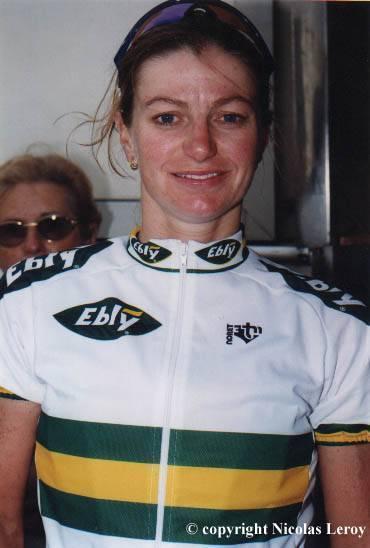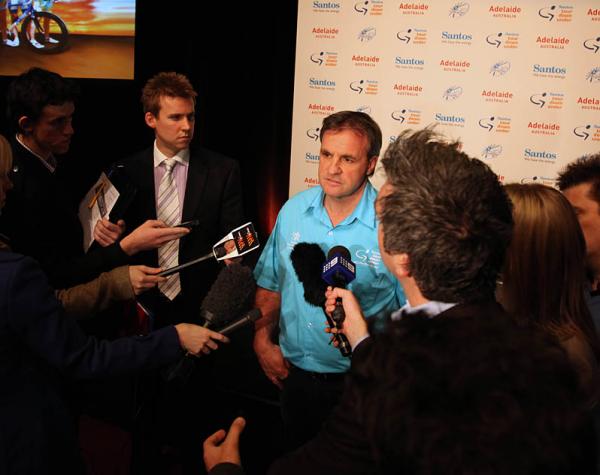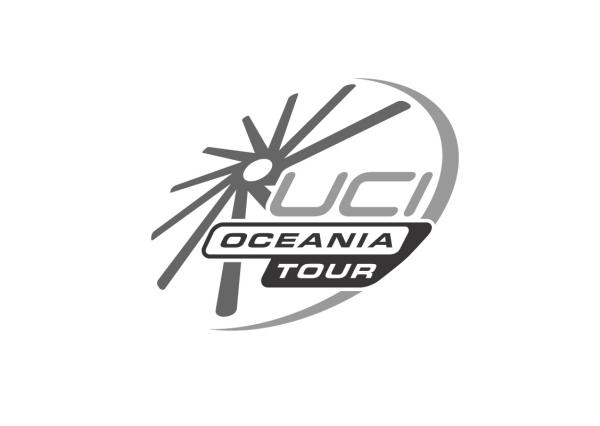Tracey Gaudry: A catalyst for change
New Oceania Cycling Confederation President talks to Cyclingnews




Earlier this month, Tracey Gaudry became just the second woman in history to have a seat on the UCI Management Committee, courtesy of her victory in the election for the role of President of the Oceania Cycling Confederation. Gaudry, the nominee of the Australia and New Zealand defeated incumbent Mike Turtur after Guam and Fiji shifted their support in the final days of the campaign.
The month leading up the vote had been intense in a time of immense change within cycling but on the eve of her first Confederation meeting, the real pressure in Oceania is yet to bubble to the surface. Gaudry had been talking with Cyclingnews for just under and hour when it was suggested that she was every inch the politician in her method of speaking about the issues at hand. Her response is a hearty guffaw.
"Not that I will toe the line and behave the way that is the nicest way to behave; I will challenge the system but I will respect that I am the new player," Gaudry states. "I'll respect the opportunity that it provides, but also the learning curve. Tomorrow's not the day to solve all the problems for the future, it's a long journey."
The vote
Gaudry indicated to Cyclingnews early on in the campaign that she hoped that there wouldn't actually be a vote. She almost got her wish. To begin with the vote was split 50-50, with Australia and New Zealand nominating Gaudry to oppose the Fiji and Guam preferred option of Turtur. The race director of the Tour Down Under had lost the support of his national federation publicly because it was deemed that Gaudry could better represent the concerns within the sport for the region. Turtur had been under fire for failing to publicise the fact that ONCE-Eroski rider Giampaolo Caruso returned a positive dope test after winning the Willunga Hill stage at the Tour Down Under in 2003. Until recently, Turtur was a staunch defendant of the reported multi-million dollar appearance fee paid to Lance Armstrong in 2009, 2010 and 2011 but in the wake of the Reasoned Decision documentation, said he felt "duped" by the revelations regarding the American. Turtur's roles as a race director and his position within the confederation had also been considered in some quarters, including Cycling Australia, as a conflict of interest.
Behind the scenes, Cycling Australia was readying for a legal battle, with Turtur very much determined to hold onto his position but such reinforcement was not required with Guam switching its vote four days before the election in Adelaide. With the writing on the wall, Turtur along with his Vice President Mike Victor attempted to resign from their positions but laws regarding the timeframe within the constitution prevented it. The vote went ahead without Turtur's attendance at the annual congress with Fiji jumping on board with Gaudry for a unanimous decision. It was the biggest sign in turbulent times that in Oceania at least, it was time for change.
Gaudry's platform is that Oceania can now be better represented with her in the role of President, given her credentials as a two-time Olympic road cyclist, CEO of the Amy Gillett Foundation, and member of the Australian Sports Anti-Doping Authority's Anti-doping Review Violation Panel, alongside Turtur's good service in retaining his role as chair of the UCI Track Commission.
Get The Leadout Newsletter
The latest race content, interviews, features, reviews and expert buying guides, direct to your inbox!
"It actually wasn't about challenging Turtur," Gaudry told Cyclingnews. "It was about recognising that at this point in time, there was an opportunity to play a role that would be one, very brave. To draw upon everything that I think I have to offer and for all of those years as an elite athlete and working in corporate and working on ethics committees and anti-doping panels. With all of that coming together it was the time to take a step forward. It was never about a competition, it was about a job needed to be done."
The separation of powers...
Gaudry sees her role as Oceania President in two parts: The role with Oceania and the role with the UCI and the Management Committee. Stemming from those roles, Gaudry believes there is a need for reform across four crucial areas starting in her first term as President.
The first is the need to professionalise the confederation. The starting points may be simple but Gaudry is firm in her belief that it's what is required. Formalised discussions in both directions which Gaudry hopes will establish Oceania as a valid entity and an entity with a voice that represents its member counties. A website that will provide a forum that's representative of the cycling public in Australia, New Zealand, Fiji and Guam. And yes, re-gaining control of the domain is on Gaudry's to-do list. Asked if her agenda had also been Turtur's and Ray Godkin's when they held the role, Gaudry is diplomatic.
"In my honest experience and my real experience I recognised that there could be a step up in the level of governance and the formal pathways between the Confederation and the member countries," she explained. "There needed to be a more formal dialogue and the role of the President in my opinion was to take those items to the MC and bring outcomes of those agenda items back down.
"I'm not saying the job was poorly done."
Another job within Oceania is to develop the sport within the smaller member nations of Fiji and Guam – getting kids riding bikes with small scale, comparatively low-cost infrastructure initiatives such as BMX tracks.
The issue of the Oceania calendar and the dwindling number of events was a key focus in the lead up to the election. As it stands in 2012, just one UCI-sanctioned event exists, the New Zealand Cycle Classic. There has been talk of merging with Asia but even that needs to be met with caution, according to Gaudry.
"It's not about getting married and how we can join up as one single region, instead what can we do together and how can we develop that relationship to bring more cycling to this region. We've got different strengths. Australia and New Zealand have got the elite athletes and the performances and the success. We've also got the ability to deliver major international events, like the Tour Down Under. The Asian region has got the economy. So those two things can come together well, but you need to date before you get married.
"There are potentially 22 member countries in the region that could be UCI members. We could be a major presence on the UCI but that will take time. There's a lot of work to be done."
As for her role on the UCI Management Committee, Gaudry is frank. She has a mountain to climb.
"It's a new world. I would consider the first year as a learning curve. It's going to be a very big learning curve. Being informed really comes in front of establishing positions and lobbying on behalf of this region and other issues," Gaudry admitted to Cyclingnews.
"It's going to take some time. I will communicate the knowledge that I'm gathering along the way and I'll also be asking questions of the public as I'm starting to prepare position statements. I'd love everyone to be involved in this process."
In an opinion piece penned for Velonews, Nicola Cranmer – arguably one of the most authoritative women in US cycling – said that the Oceania Confederation "is probably the least influential seat in the house" but was supportive of the role that Gaudry had to play. It was a potential ouch moment, but Gaudry was again diplomatic while still brushing away the suggestion.
"It's not for me to say right now without having the experience of having sat on the Management Committee the influence that the Oceania Confederation has," Gaudry explained. "The way I see it is that there are 19 members of the UCI Management Committee. Every member is either a member because they represent a region or they were a voted member. Once you sit on the Management Committee you have a voice and you have a voice equal to the other votes. That's the way I need to view this position."
Gender on the agenda?
The poor state of women's cycling and the perceived shortfall in support by the UCI for women in terms of pay and opportunities at a minimum inherently means that Gaudry's appointment is a timely one. The 43-year-old accepts that as a woman there is added pressure on her to bring about reform to women's cycling, but she warns that any sense of tokenism should be withheld.
"When I nominated, the reasons were not gender-based," Gaudry told Cyclingnews. "The gender piece was obviously the elephant in the room and I'm embracing that as a great opportunity because what has already happened is that there are people in the system, women and men, who are saying okay, we now are brave enough to take a step forward as well."
The UCI clearly states in its constitution that it "... will carry out its activities in compliance with the principles of: a) equality between all the members and all the athletes, licence-holders and officials, without racial, political, religious, or other discrimination..." Yet the reality is that there is currently very little equality between the sexes when it comes cycling under the UCI's vast umbrella.
It was just over 12 months ago that Gaudry was very open with Cyclingnews about her ‘disgust' regarding the lack of support for women in elite cycling. Now with her position as Oceania President confirmed and with the question hanging in the air as to whether the UCI did in fact discriminate against women, Gaudry was at first as judicious in her response as any sweaty politician running the policy gauntlet, before getting to the point.
"I have to be very careful. I'm about to attend a UCI Management Committee meeting in January," Gaudry offered. "Rather than say discrimination, I'm being purposefully objective here; perhaps there's been a lack of recognition of the opportunity that greater representation and greater diversity can bring to cycling.
"As a female ranked third in the world and competing in category one world tours we were sleeping in dormitories on mattresses with no blankets, with no sheets and we were being fed chips and beans for dinner. So in my experience the conditions in that time were for professionals at the peak of their sport, conditions that you would not subject an employee to let alone someone who was doing it for very little if not no remuneration. That was my personal experience and it's my understanding that a lot of those conditions remain today. However I'm now part of the system who believes we can make improvements."
Like it or not, the cycling public will now be looking to Gaudry to be a catalyst for meaningful change in the state of women's cycling.
After the big bang...
Gaudry is the first to admit that Reasoned Decision and the subsequent announcement by the UCI of an independent commission into its anti-doping processes, ‘blew the lid off' the past and created enormous potential for the sport's future.
As a member of the Australian Sports Anti-Doping Authority's Anti-doping Review Violation Panel, Gaudry has great perspective on where cycling sits within the sporting landscape and is pleased with its performance. At the same time, she is eagerly awaiting the independent commission's findings, due in June 2013.
"The UCI needs to take this as the most serious time in its recent history," Gaudry said. "It's the greatest opportunity to take the outcomes of the independent commission seriously and to utilise those as the catalyst for a better future.
"Now is the time where history cannot continue to dictate the future. It needs informed people and it needs people who are brave and are willing to challenge the paradigm and who are prepared to take the considered decisions and who are prepared to take the knocks when it's sometimes easier just to work with the system.
"In my view it's much better to work within the system, that's the way I operate as a person and professionally, rather than throwing hand grenades."
As a sports journalist and producer since 1997, Jane has covered Olympic and Commonwealth Games, rugby league, motorsport, cricket, surfing, triathlon, rugby union, and golf for print, radio, television and online. However her enduring passion has been cycling.
Jane is a former Australian Editor of Cyclingnews from 2011 to 2013 and continues to freelance within the cycling industry.